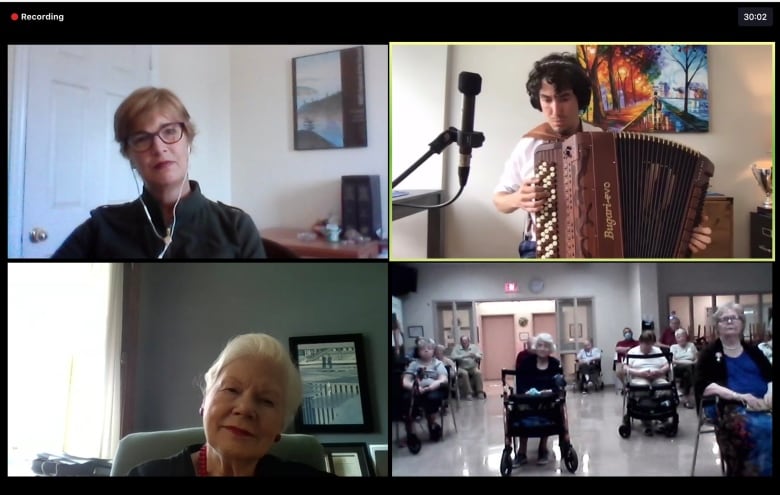How music is providing a lifeline to seniors in care during the pandemic
Organizations like Concerts in Care offer performances virtually amid COVID-related restrictions

When the COVID-19 pandemic forced visitors out of Jack Long's nursing home, one of the things he quickly missed were the concerts.
A professional trumpet player himself, Long grew up in a family of musicians and went on to found Long & McQuade, a Canada-wide chain of music stores. So the live performances at his Toronto care home each week were a real highlight.
"They were one of the reasons I like this place," said Long, noting he and his friends at the residence felt more isolated once the concerts stopped.
While music fans around the world were disappointed as venues shut their doors to slow the spread of COVID-19, the loss of live music has been particularly detrimental for many seniors in long-term care.
Studies have shown that the benefits of music go beyond lifting our spirits, and music has even been prescribed as therapy for people suffering from such conditions as Parkinson's, dementia and depression.
In patients with late-stage dementia, for example, vocal ability and physical movement have been shown to improve through music therapy, allowing patients to express themselves more easily.

Studies further show it can decrease aggressive and agitated behaviours in those with dementia. When group-singing sessions were studied in dementia patients, depressive symptoms went down and participants said they felt less lonely.
The slow and often-frustrating movement impairments common with Parkinson's disease can also improve after such therapy. Today, a number of long-term care homes and hospitals now employ music therapists.
And so when restrictions were brought in to protect vulnerable residents from COVID-19 at many long-term care homes, organizations mobilized to find ways to fill that music void.
Over the past 10 years, the Toronto-based non-profit Concerts in Care (CIC) has arranged more than 2,100 concerts for seniors at various care homes in the Greater Toronto Area. When the pandemic hit, the group knew it needed to get back into these spaces quickly.
"We are a lifeline to memories, connections and social interaction – even over Zoom or through our live recorded videos," said Debra Chandler, executive director of CIC.
Since the start of the pandemic, Concerts in Care has arranged some 145 live Zoom concerts and further offers 35 recorded concerts, reaching audiences in Ontario communities where professional musicians are often harder to come by, such as Cornwall, Peterborough and Thunder Bay.
The group has also put on outdoor and distanced performances, where possible.

Chandler recalled one experience where a trumpet player was able to perform from a balcony across from a retirement home. She also knows of a group of women in Sudbury, Ont., who gather weekly to watch the organization's live Zoom concerts.
Impact felt by artists, too
It wasn't just elderly audiences impacted by strict visitor bans brought on by the pandemic; performers like Brenton Chan, a professional cellist at the University of Toronto and former orchestral player, found themselves out of work.
Chan had enjoyed playing at seniors' homes, which was his primary work. His setlists were flexible, as he catered to requests, and instead of going backstage after performances, he was able to stay and chat to residents and hear their stories.
But when the pandemic meant he was shut out, Chan — and other musicians like him — struggled to find avenues to play music live.
The virtual concerts offered by CIC presented an opportunity to "open their lives" again, Chan said, providing a pathway to perform despite the public health restrictions.
Elizabeth Dowdeswell, Ontario's lieutenant-governor, wanted to help once she learned of the loss of concerts in nursing homes. Her mother was an opera singer and would fill her childhood home with singing and piano playing — memories she holds dear.
Drawing on that love of music, Dowdeswell said she saw an opportunity to both support isolated seniors and help employ Ontario's musicians when she learned of how CIC had been shut out.
"It was like hitting two birds with one stone," she said.

Dowdeswell helped to initiate the first CIC concerts over Zoom in late July of 2020. The online shows reached thousands in the initial months they were offered, and live Q&A periods were offered for any seniors watching live, allowing for some socialization and giving seniors a chance to chat in real time with performers.
And even though the shows were offered virtually, Dowdeswell described the Concerts in Care experience as intimate. "You could see people's living rooms and see into their lives," she said.
'Hybrid is here to stay'
Going forward, Concerts in Care plans to continue a combination of in-person and online programming, allowing the organization to be flexible in delivering high-quality performances to seniors.
"Hybrid is here to stay," said Chandler, noting that by providing their concerts in new and virtual formats, the group is further diversifying its audience.
"While our seniors are isolated in their rooms or on their floors again, we will do everything we can to get the music to them," she said.
And though Chan has been able to go back to in-person performances, he says he's learned to appreciate the flexibility that virtual performances allow.
Artists performing online might have more time to chat during and after the performances, without the added pressure of travel time, he said. And musicians have an opportunity to "show parts of their lives," such as their kids or pets.
The expansion of Concerts in Care during the pandemic has created some challenges for the organization: it now maintains a wider web of musicians and care homes, and the transition to a hybrid model requires additional funding.
But Chandler says the benefits of connecting with previously unreachable populations and the flexibility it allows far outweighs the challenges.
"Music helps seniors connect with memories and feelings," she said.
And for them, music is an essential service.